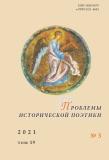Идея родственной любви в романе Ф. М. Достоевского «Подросток»
The Idea of Kindred Love in F. M. Dostoevsky’s The Raw Youth
Author(s): Irina Anatolievna Kiseleva, Elena S. SakharchukSubject(s): Novel, Russian Literature, 19th Century, Theory of Literature, Pedagogy
Published by: Петрозаводский государственный университет
Keywords: spiritual growth; “The Raw Youth”; Orthodox upbringing; kindred love; novel of upbringing; family; F. M. Dostoevsky;
Summary/Abstract: The article clarifies the genre content of the novel The Raw Youth as a novel of education, reveals the philosophical and pedagogical ideas of F. M. Dostoevsky regarding the principles and content of spiritual and moral upbringing in the Orthodox environment. The connection between the artistic presentation of the upbringing process in the novel and the author’s ideas, which are essentially similar to the ideas of the Christian anthropology school in late 19th century pedagogy, is outlined. In contrast with and in overcoming the “accidental family,” which is extralegal in the spiritual and civil sense, Dostoevsky offers society the idea of kindred love, which is manifested in the “mind of the heart” (emotional intelligence), the unity of value and moral grounds, mutual respect and support and non-violent relations. Depicting the story of the “accidental family,” which was the result of God’s indulgence of human infirmity and lack of reason, F. M. Dostoevsky allows the heroes and the reader to see the human relations ideal in the phenomenon of the family. The former correlates with the will of God and the essential world order. The novel is understood as a representation of a person’s spiritual path. The interpretation of the negative role of Versilov in the spiritual formation of Arkady Dolgoruky undergoes a critical examination. Positive changes in the soul of the Raw Youth are determined by the desire to know and the knowledge of the father’s spiritual make-up. The space of kindred love and family is revealed to be instrumental in the emergence of the collective personality of the Raw Youth and in the spiritual enrichment of all family members. The author concludes that the development of a young person is conditioned both by his own search for the ideal, which is typical for youth, and by the joint efforts of the family that moves towards its ideal through overcoming the separation, which is a source of suffering.
Journal: Проблемы исторической поэтики
- Issue Year: 19/2021
- Issue No: 3
- Page Range: 150-169
- Page Count: 20
- Language: Russian

